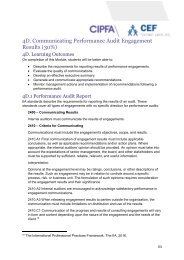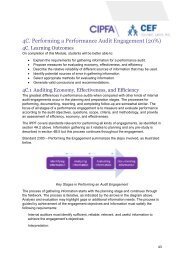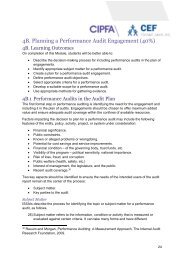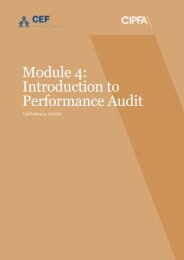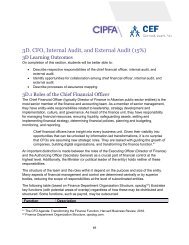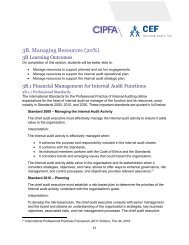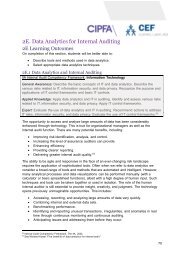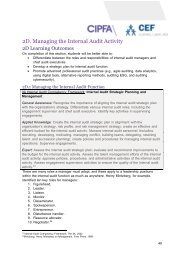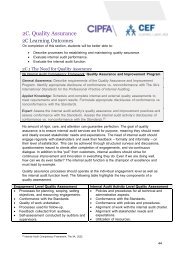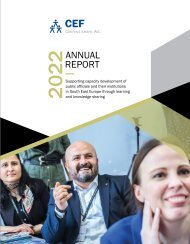TIAPS Module 1 Audit and Assurance workbook
Create successful ePaper yourself
Turn your PDF publications into a flip-book with our unique Google optimized e-Paper software.
Although developed for government at a local level, the Council of Europe’s 12 Principles of<br />
Good Governance are relevant to most public sector bodies:<br />
1. Participation, Representation, <strong>and</strong> Fair Conduct of Elections.<br />
2. Responsiveness (to the expectations <strong>and</strong> needs of citizens.)<br />
3. Efficiency <strong>and</strong> Effectiveness.<br />
4. Openness <strong>and</strong> Transparency.<br />
5. Rule of Law.<br />
6. Ethical Conduct.<br />
7. Competence <strong>and</strong> Capacity.<br />
8. Innovation <strong>and</strong> Openness to Change.<br />
9. Sustainability <strong>and</strong> Long-term Orientation.<br />
10. Sound Financial Management.<br />
11. Human Rights, Cultural Diversity, <strong>and</strong> Social Cohesion.<br />
12. Accountability. 8<br />
Albanian Context<br />
The president of Albania is the Head of State <strong>and</strong> comm<strong>and</strong>er in chief while the prime<br />
minister is the head of government. The highest executive authority rests with the prime<br />
minister <strong>and</strong> the cabinet (Council of Ministers) while parliament is the head of legislative<br />
power. The third branch – the judiciary – is independent from both the executive <strong>and</strong><br />
legislative branches.<br />
Membership of the Council of Ministers includes ministers, deputy ministers, <strong>and</strong> secretaries<br />
general. Ministries may have varied internal structures <strong>and</strong> numbers of subordinated entities<br />
(known variously as directorates, agencies, centers, offices, authorities, academies,<br />
inspectorates, institutes, commissions, committees, services, <strong>and</strong> more). A subordinated<br />
entity is accountable to its line ministry.<br />
For the purposes of government, Albania is divided into 12 administrative counties <strong>and</strong> 61<br />
municipalities. Albania was granted EU c<strong>and</strong>idate country status in 2014 <strong>and</strong> this is a major<br />
driver for ongoing public administration reform at all levels as well as a impetus to implement<br />
public internal financial control (PIFC). For more detail on PIFC, refer to <strong>Module</strong> T3<br />
Accounting Fundamentals. In accordance with Albanian law, all public entities are required<br />
to establish internal audit services, if not directly then via its superior institution (e.g., from<br />
the Ministry to a subordinated entity), from another public unit, or by contracted services.<br />
The head of the internal audit function should report to the head of the public unit. The<br />
Minister is appointed by the Prime Minister, is politically accountable for performance, <strong>and</strong> is<br />
the highest decision-making authority responsible for setting policy. The Secretary-General<br />
is the most senior civil servant in charge of executing policy. These factors are relevant for<br />
consideration <strong>and</strong> evaluation of internal audit independence.<br />
8<br />
12 Principles of Good Governance, Council of Europe, 2008.<br />
13





